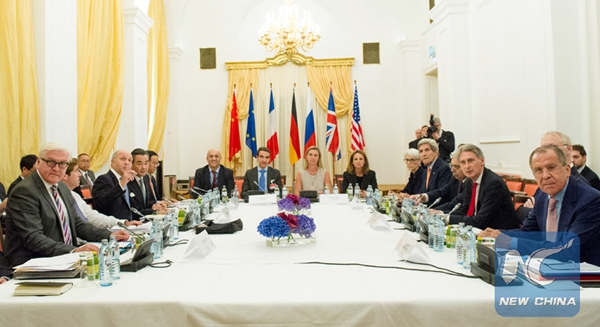Iran deal signifies US success and decline
- By Jin Liangxiang
 0 Comment(s)
0 Comment(s) Print
Print E-mail China.org.cn, July 18, 2015
E-mail China.org.cn, July 18, 2015
|
|
|
Delegates from the EU and P5+1 attend a meeting on the sidelines of the nuclear talks between Iran and world powers in Vienna, capital of Austria, on July 7, 2015. [Xinhua/Qian Yi] |
On July 14, P5+1 and Iran finally reached a historic deal on the Iran nuclear issue, formally named the Joint Comprehensive Plan of Actions. Very few international issues have attracted so much attention as this one. Though it is primarily a big success for the United States, it also means challenges for Obama's administration.
There is no doubt that the deal in no way signifies the conclusion of the nuclear issue. It is predicted that it will be more difficult to implement the deal than it was to negotiate it. American and Iranian hardliners and Israelis and Saudis will be making every effort to sabotage the implementation of the deal as they did in opposing the negotiation of the deal. But the peaceful resolution of the issue and the reconciliation between the United States and Iran will be an irreversible process since there are more supporters than opponents.
The success of U.S. diplomacy in this regard firstly lies in finding an economical way to prevent Iran from developing nuclear weapons. There are two kinds of points of view regarding the ways to address the Iran nuclear issue: the military way and negotiation. Though some U.S. and Israeli hardliners favor a military solution, negotiation is the cheapest and most reasonable way out, particularly as the U.S. can no longer afford another war in the Middle East against a nation with more than 80 million people.
When challenged with the question of why the U.S. should sign the deal, John Kerry counter-questioned, "Should we fight a war with Iran"? It was certainly a reasonable answer.
What's more, even if the United States really was able to launch a war, it does not mean that the problem could really be solved. War can destroy the facilities, but it cannot take away something in the mind. As for Iran's nuclear program, it is not just physical facilities, but also knowledge in the minds of scientists.
The deal also paved the way for the United States to adjust its policy toward Iran and the Middle East. The U.S. adopted the policy of containing Iran for most of the time since the Islamic revolution and even almost launched a war against Iran after the Iraq War while allying with Saudi Arabia and protecting Israel. But it seems that the U.S. can no longer afford to contain Iran because of the lessons of the Afghanistan and Iraq wars, America's limited strategic resources and Iran's increasing power.
By reaching the deal with Iran, the United States is not only able to keep Iran nuclear issue on a diplomatic track but also to initiate its policy to engage Iran and even seek Iran's assistance in dealing with major regional issues. Engagement might arouse anger and dissatisfaction among Saudis and Israelis against the U.S. in the short term, but in the longer run, the U.S. will be able to manage regional issues through more balanced way.







Go to Forum >>0 Comment(s)